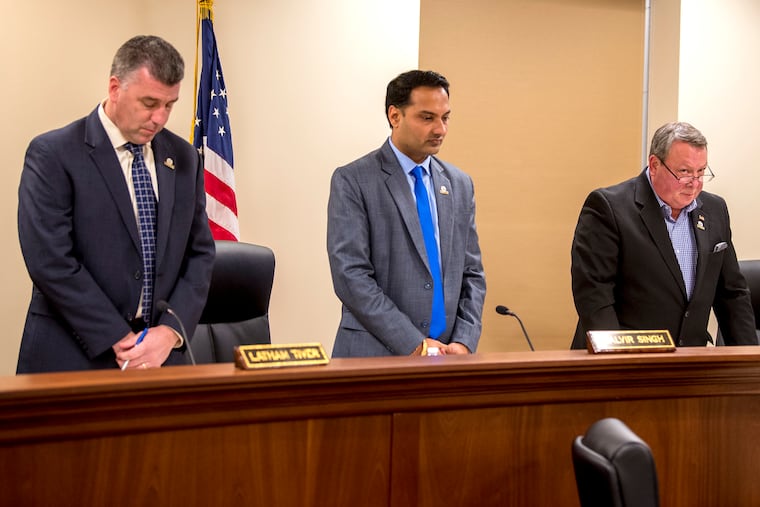Gov. Phil Murphy leads New Jersey push to drop ‘freeholder’ title, rooted in slavery, from local governments
New Jersey is the only state that still uses the odd, centuries-old title — chosen freeholder — for its elected county government officials. Previous attempts to change it fell short. Most states use commissioner.

New Jersey lawmakers want to replace the title of county freeholder, a slave-era term “rooted in racist attitudes and practices” and offensive to Black people and women, and change it to commissioner.
Two powerful Democrats announced Thursday that lawmakers will consider legislation next week to abolish the title and require county governments to stop using the term to describe their top elected officeholders. Gov. Phil Murphy expressed support also, saying the word is outdated.
New Jersey is the only state that still uses the odd, centuries-old title “chosen freeholder” for officials that in most states are called commissioners. Previous attempts to change it fell short.
Lawmakers say they were prompted, in part, to reintroduce a bill sponsored by State Sen. Joe Pennacchio, (R., Morris), in light of the civil rights movement ignited by the slaying of George Floyd by a Minneapolis police officer.
“We are committed to forever ridding from our state, long past overdue … the word freeholder,” Murphy said at a Friday briefing. “It is high time this name went into the dustbin of history, and I’m very happy we’re going to do it.”
» READ MORE: Is the term 'freeholder' offensive? Some N.J. lawmakers say it is.
According to Senate President Stephen Sweeney, (D., Gloucester), the title is derived from an old-English term that referred to “free land owners” at a time when only white men could own property. The property could include enslaved people.
Sweeney, a former Gloucester County freeholder, said the title “is mired in the language of slavery.” When the term was first used in the 1500s, it described who was eligible to hold public office — white males who owned land and were free from debt. Black people and women could not own property, thus barring them from holding elected office.
“It’s very offensive,” Loretta Winters, president of the Gloucester County chapter of the NAACP, said Friday. “The change is long overdue. To be called a freeholder is an insult today.”
Burlington County Freeholder Director Felicia Hopson, the first Black Democrat to hold the position in the predominantly white county, called the possible change refreshing. She said she was surprised to learn about the origin of the word when she ran for office in 2018.
“For it to happen now and in this Black lives movement speaks volumes,” said Hopson, of Willingboro. “We really need to look at all facets of systemic racism.“
Several other freeholders, including Jeff Nash, a longtime member of the Camden County Board of Chosen Freeholders, agree with the proposed change. Nash opposed the bill in 2018, saying then that the Legislature had more important issues to tackle.
» READ MORE: The Democrats take charge in Burlington County. They want to dump the Pinelands chairman, stop the pipeline.
“If it represents something that is not viable today or meaningful, it should be changed,” said Nash, a Democrat, who has been a freeholder for nearly three decades. “It’s not going to change my passion for the job.”
Previously, the bill received pushback from other freeholders, including the Southern New Jersey Freeholders’ Association, which objected because the change would cost thousands of dollars to replace signs, ballots, and stationery. Others said the word “commissioner” is too common in the state.
Voters in each county elect freeholders; typically five to seven members who serve three-year terms. They manage taxpayer-funded budgets, oversee property, parks, jails, roadways, and govern county affairs.
Changing the title would help alleviate confusion outside New Jersey and among residents because not many know what their elected representatives do, Pennacchio said. Assembly Speaker Craig Coughlin, (D., Middlesex), expressed support in a joint statement with Murphy and Sweeney.
“It’s the right thing to do,” said Camden County Freeholder Director Louis Cappelli. ”It’s a very strange term.”
If enacted, the legislation would require New Jersey’s 21 counties to change the title of “chosen freeholder” to “county commissioner” and “board of chosen freeholders” to “board of county commissioners.” It would also require counties to update their letterheads, stationery, websites, and other documents within a year, but not if replacing them would cost county taxpayer funds.
The bill, S-855, will be considered by the Senate Community and Urban Affairs Committee at its July 16 meeting.
Staff writer Rob Tornoe contributed to this article.